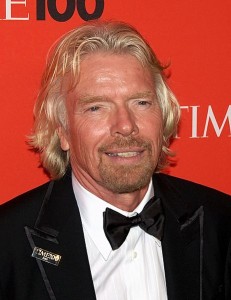These days, it seems that the peer-to-peer decentralized virtual currency bitcoin needs a shot in the arm because the negative publicity it has garnered over the past month or two. Enter: Sir Richard Branson.
Branson, a billionaire entrepreneur who made headlines late last year after announcing Virgin Galactic would accept bitcoins for space flight, reaffirmed his commitment to the digital currency by calling it “the pioneer of a global currency.”
Speaking in an interview in the April issue of Delta’s SKY Magazine, Branson briefly touched upon the cryptocurrency and labeled its creator as “a genius” for producing bitcoins and creating a technological breakthrough. He did concede, though, that there are some flaws in it, including transparency and that nobody knows who Satoshi Nakamoto is.
 “It may not be the perfect global currency of the future yet, but it’s the pioneer of a global currency,” stated Branson.
“It may not be the perfect global currency of the future yet, but it’s the pioneer of a global currency,” stated Branson.
Is bitcoin the future of global currency or will somebody else establish something better?
Echoing earlier sentiments from other investors and entrepreneurs, Branson argued that the future will likely bring about a successful digital payments method with transparency, such as Jack Dorsey, co-founder of Twitter, and his Square firm, a company that specializes in making credit and debit card transactions simpler.
“He’s the kind that’s more likely to come up with the currency of the future that would be completely transparent,” Branson noted. “Maybe using the Virgin Money brand.”
This isn’t the first time that a prominent individual has espoused the possibility of a virtual currency of the future that would perhaps the correct the past mistakes of bitcoin, litecoin and other cryptocurrencies dominating the marketplace today.
Aside from the debate as whether to classify bitcoin as a currency or innovative electronic payment tool, finance and tech experts have speculated that there will inevitably be a successor to bitcoin.
Microsoft co-founder Bill Gates responded to questions on Reddit in February and projected that the digital currency industry could soar within the next five years and could very well revolutionize the banking system. However, he did not cite bitcoin as being the only tool to perform that function.
“The foundation is involved in digital money but unlike Bitcoin it would not be anonymous digital money. In Kenya M-pesa is being used for almost half of all transactions,” wrote Gates.
“Digital money has low transaction costs which is great for the poor because they need to do financial transactions with small amounts of money. Over the next 5 years I think digital money will catch on in India and parts of Africa and help the poorest a lot.”
We even reported in March that some believe central banks will enter the virtual currency market. Many believe this will transpire because the industry has become both “persuasive and credible” within the past year.
“It’s fair to point out that even with today’s very low interest rates, there’s something very attractive about having your own currency and, basically, those bills that we carry around with us don’t pay any interest at all,” said Peter Warburton, director of U.K.-based Economic Perspectives, an economic consulting firm, in an interview with Newsmax. “It’s free money for the issuing body and so this is a privilege that central banks want to hang on to.”
Whether or not bitcoin will go the way of MySpace or persist as being as dominant as Facebook remains to be seen. Whatever the case, bitcoin will likely be placed in the history books as an important innovation in technology.



